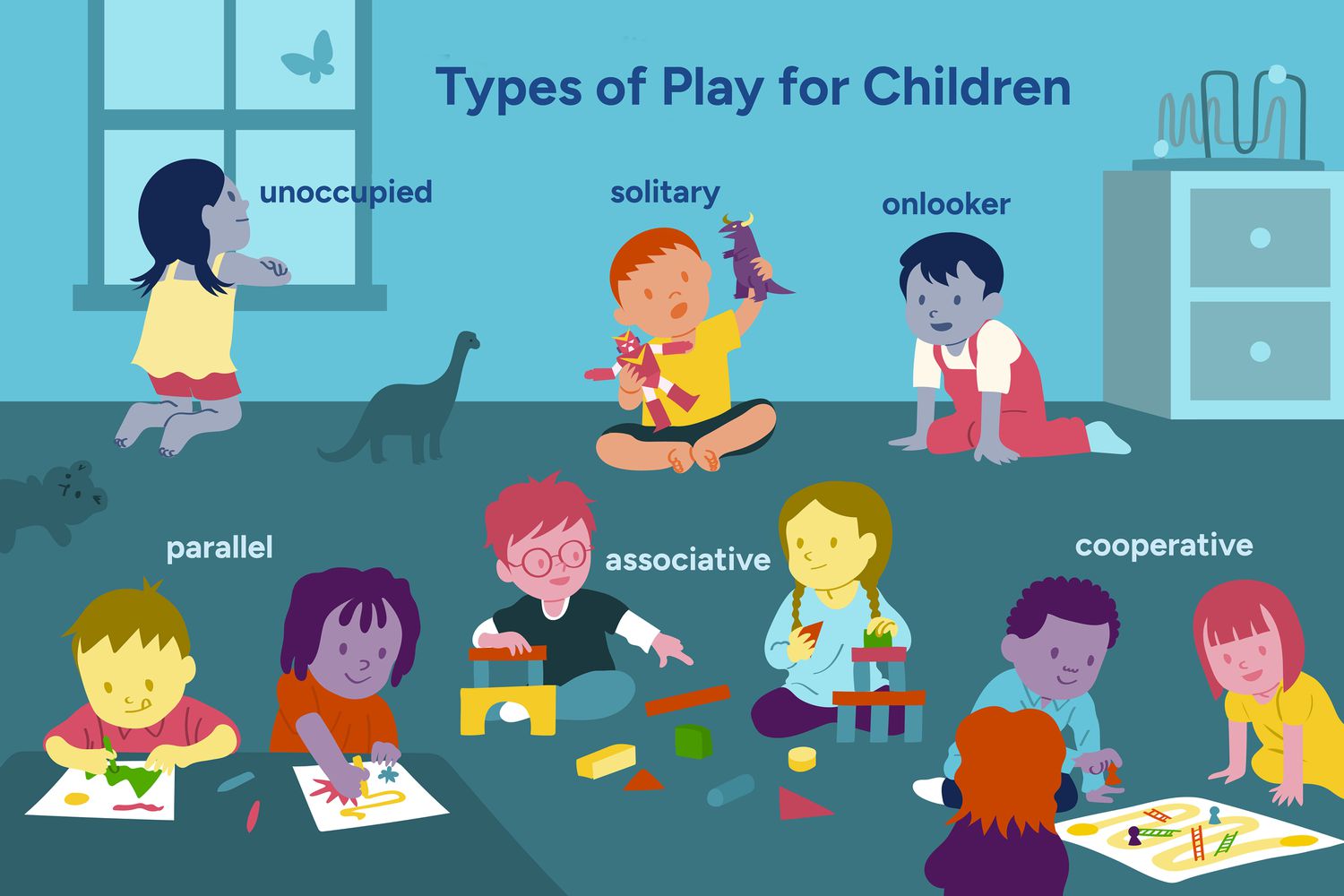Have you ever watched your child play and wondered what’s really happening in their mind?
Play isn’t just a way to pass time – it’s how kids grow, connect, and understand their world. From building blocks to pretend tea parties, every playful moment reflects a deeper stage of development.
This article will help you see the true power behind those giggles and games. Whether you’re a parent, teacher, or caregiver, understanding play gives you tools to support a child’s growth with confidence and care.
Unoccupied Play
Unoccupied play is common in newborns and very young babies. It involves random movements like kicking, stretching, and waving arms. These actions may look aimless, but they help babies learn how their bodies move.
Toys with high-contrast patterns or soft sounds are ideal during this phase. They catch a baby’s attention and encourage them to focus or follow with their eyes. Even short play sessions help develop sensory and motor skills early on.
Solitary Play
Solitary play happens when a child plays alone and focuses only on their own activity. This type of play is natural and healthy in the early years. It helps children explore the world at their own pace without outside pressure.
Soft plush toys, mirrors, and shape sorters are great choices for this stage. These toys support independent thinking and hand-eye coordination. Children also begin to show preferences for certain toys or actions.
Exploratory or Sensorimotor Play
Sensorimotor play lets children learn by touching, mouthing, and shaking things. They explore textures, sounds, and shapes with their hands and mouths. This stage is all about discovery through the senses.
Rattles, textured balls, and teething toys support these new experiences. These toys help babies understand what happens when they take action. It also builds memory, repetition, and early problem-solving skills.
Symbolic Play
Symbolic play begins when children start pretending one object is something else. A spoon might become a plane, or a pillow can turn into a mountain. This kind of play shows imagination and growing abstract thinking.
Pretend food, toy animals, and dress-up props help kids act out real-life scenes. These tools help develop vocabulary, storytelling, and emotional expression. When chosen thoughtfully, good toddler toys can encourage more creative scenarios and richer pretend experiences.
Parallel Play
Parallel play is when children play side-by-side but do not interact much. They may notice or copy each other but still play alone. It’s a natural step in learning how to be around peers.
Blocks, cars, or simple puzzles work well for this kind of play. Kids stay focused on their own activity while becoming aware of others. This stage helps ease them into social settings without pressure.
Constructive Play
Constructive play allows children to build and create something new. They may stack blocks, make a tower, or create a picture with crayons. It’s a great way for them to learn cause and effect.
Toys like LEGOs, clay, and magnetic tiles are perfect tools. They support creative thinking, patience, and fine motor control. Children also begin to plan, test, and change their ideas as they play.
Associative Play
Associative play happens when kids start interacting more but still play with their own goals. They share materials and talk but don’t fully work together yet. It’s a mix of social and solo play.
Toy kitchens, costumes, and art supplies are great for this phase. Children begin to take turns, talk, and react to each other’s ideas. This stage helps grow communication and early teamwork skills.
Dramatic or Fantasy Play
Dramatic play lets kids act out stories, feelings, and roles. They may pretend to be superheroes, doctors, or animals. This play helps children understand emotions, actions, and choices.
Props like costumes, puppets, and dollhouses encourage this type of storytelling. They let children express feelings they might not have words for yet. It also builds empathy and language through pretend conversations.
Cooperative Play
Cooperative play is when children play together with a shared goal. They follow rules, solve problems, and help each other. This kind of play strengthens social and emotional skills.
Board games, group-building sets, and team challenges support this interaction. Kids learn about leadership, compromise, and fairness. Working together builds trust and deepens friendships. Adding a Target Omni setup can further enhance cooperative play by introducing fun, skill-based challenges that encourage teamwork, communication, and friendly competition among children.
Physical or Active Play
Active play includes running, climbing, jumping, and moving the whole body. It helps children grow strong, stay healthy, and release energy. This kind of play builds both muscles and confidence.
Balls, jump ropes, ride-on toys, and climbing frames are great tools. They support coordination, balance, and endurance. Kids also learn limits and build resilience through physical effort.
Games with Rules
Games with rules help children understand structure and fairness. They learn to wait their turn, follow directions, and accept outcomes. These games also build patience and decision-making.
Card games, sports, and board games fit well at this stage. They improve focus and teach kids how to handle wins and losses. These games make learning rules feel fun and engaging.
Digital Play
Digital play involves screens and tech-based learning. When used with care, it can support creativity, logic, and memory. Children love tapping, swiping, and exploring virtual worlds.
Interactive apps, coding games, and smart toys offer valuable experiences. These tools should be age-appropriate and used with guidance. With balance, digital play can be a healthy part of development.
Constructive Play
Constructive play allows children to build and create something new. They may stack blocks, make a tower, or create a picture with crayons. It’s a great way for them to learn cause and effect.
Toys like LEGOs, clay, and magnetic tiles are perfect tools. They support creative thinking, patience, and fine motor control. Good toddler toys can also grow with the child, offering more complex challenges as their skills develop.
Every Block Stacked Tells a Story of Growing Minds
Children don’t need perfect plans or fancy lessons to learn – they need time, space, and the freedom to play. When we take play seriously, we respect how children explore and express what matters most to them. Behind every game is a chance to grow, connect, and discover something new.
Let’s not rush childhood. Instead, let’s listen, observe, and join the journey through play – one small moment at a time.
Were you satisfied with the information in this article? If yes, our blog offers even more valuable resources.

Dilawar Mughal is an accomplished author with a passion for storytelling. His works span various genres, from thrilling mysteries to heartfelt romance novels. With a keen eye for detail and a knack for character development, Sana Fatima weaves engaging narratives that captivate readers and transport them to new worlds.










